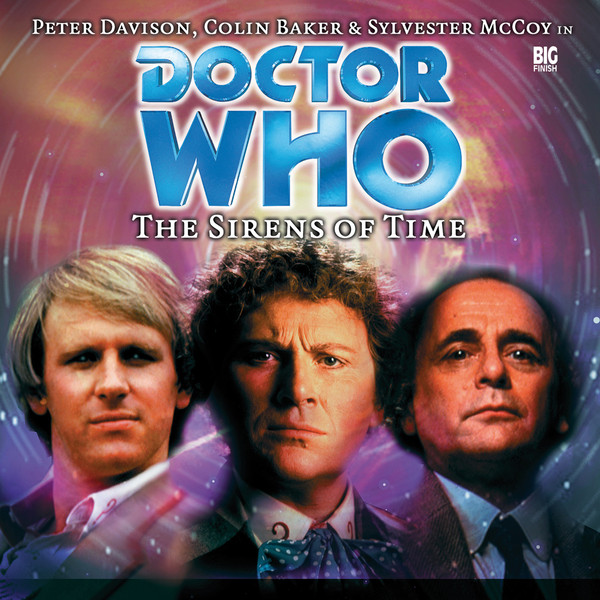
Released July 1999
As the first recorded Doctor Who story since the 1996 TV Movie, ‘The Sirens of Time’ carried significant hype and burden into its release, attempting to prove a successful launching pad for a continued audio range. Featuring the three Doctors that Big Finish had acquired the rights to at the time, Peter Davison, Colin Baker, and Sylvester McCoy are brought together (without companions) to reunite listeners with each actor’s bygone era and to save Gallifrey and time itself.
‘The Sirens of Time’ starts off strongly, and the opening scenes with Coordinator Vansell arriving on Gallifrey to explain that something is wrong with time and that it involves with the Doctor are befittingly interesting. This sets the scene for a bold story choice as each of the three Doctors stars in an individual and seemingly disparate episode- each meeting with a female character played by Sarah Mowat soon after arriving- before coming together for the fourth story.
Episode one features McCoy’s Seventh Doctor, but unfortunately it is not a strong start to the story or to the range. Early Big Finish stories suffer from some awkward expository scenes, and that is certainly the case here as McCoy talks to himself to explain what is going on when the TARDIS materialises. Regrettably, not much happens through the course of this episode; events can easily be summed up as the Doctor firstly meeting a girl, Elenya, who pulls the Doctor into the events on the mysterious planet and secondly an elderly prisoner for war crimes, Sancroff, who is the target for a group of bio-assassins. Sadly this episode feels rather insignificant, despite introducing the Knights of Velyshaa and the Drudgers which would also feature in later big Finish projects, as the relevance of these events is not explained until the fourth episode.
Episode two features Davison’s Fifth Doctor, and while it contains much more intrigue than the preceding episode, it still suffers from many of the same issues. Here the TARDIS lands upon a World War I German submarine, and the rest of the episode has the Doctor trying to return to his ship and regain entry. Along the way he comes upon a girl, Helen, who mysteriously disappears at the end of the story, and some of the ship’s crewmembers, all serviceable in their roles but not given any truly distinguishing characteristics or scene. Still, Coordinator Vansell does try to bring about the death of Doctor through Time Lord technology in order to save Gallifrey, so a connection to the bigger plot at least briefly manifests itself before the episode ends.
Episode three features Baker’s Sixth Doctor and shares many similarities with the previous episode. Here the TARDIS materialises on the starship Edifice and the Doctor soon meets a young girl, Ellie. This episode has grander designs, though, as it is here that the Doctor comes upon and releases the Temperon. Vansell again utilises Time Lord technology to control a resident of that time, but this time tries to communicate with the Doctor rather than trying to kill him. Ellie kills the possessed Azimendah, and it is here, just as the episode ends, that the Doctor realises she is up to something suspicious.
And so it is up to the fourth episode to bring everything together satisfactorily. Unfortunately, because so little happens in the preceding three episodes, the final episode is muddled with details, both expository and explanatory. Very quickly, information is dropped about the altered time lines caused by the Doctor, the Knights of Velyshaa and their invasion of Gallifrey, and the Sirens of Time with their Knight Commander Lyena (the characters played by Mowat). Sadly most of this information is presented by characters standing around and talking with little action taking place. The resolution is also a bit disappointing as a reset button of sorts is pushed as the Doctor unleashes the Temperon to confine the Sirens for eternity.
What ‘The Sirens of Time’ does do well, though, is reintroducing these three classic Doctors in a recognisable manner. The Fifth Doctor is a bit more on the indecisive side but still willing to sacrifice himself for the greater good, the Sixth Doctor is arrogant and pragmatic but also softer than his on-screen persona, and the Seventh Doctor is quite serious and restrained, not yet quite the manipulative Time’s Champion of the Virgin novelizations but also not the clownish figure of his early televised adventures. While the running time of the episodes does not allow for much in the way of characterization of the supportive roles, special credit must be given to Anthony Keetch’s Vansell, a ruthless and hardnosed man with only the best interest of Gallifrey at heart. He is willing to sacrifice the Doctor when it seems that is the best choice of action, but he is also willing to admit his mistake when he realises the Doctor provides their best hope going forward.
In the end, then, this story is perhaps a bit too ambitious for the opening story of a range. The setup and formatting is a clever approach to a multi-Doctor story, and the production values and actors are all top-notch, but there is just too little payoff for seemingly unrelated events throughout the three episodes to keep interest. Likewise, the conclusory episode is just too laden with lengthy dialogue scenes to deliver any real enjoyment needed for that ultimate payoff. With plenty of nonintrusive continuity references throughout, it is clear from the start that this will be a series for the fans, and glimmers of greatness are already present that offer hope for more smoothed and unbroken stories going forward
- Release Date: 7/1999


Leave a Reply